Student Blog
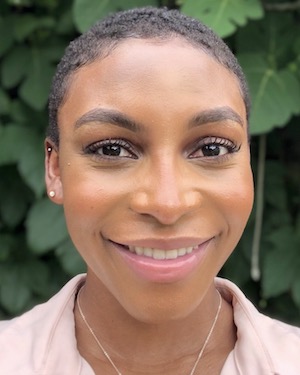
Back in Business ⟩
August 24, 2020, by Lamoni
Today is the first day of classes for the fall semester and it honestly blows my mind! The week off between summer and fall FLEW by. I spent half of it driving to Los Angeles and the other half moving into my new place. It was a break from school but definitely still a busy week. Though the drive was not unbearable (and it was my second time), I do not plan on doing it again. From New Orleans to Los Angeles is nearly 30 hours and 2,000 miles long. Luckily, my mom decided to drive with me and split the load. I am so happy that she did! Though I was home since March, my mom and I had not spent much time together. I was always in my room tending to some sort of work. So, this road trip to school was some much-needed mother-daughter time before officially being in another state for several months. We spent the hours jamming to throwback 90s R&B and chatting about old memories.
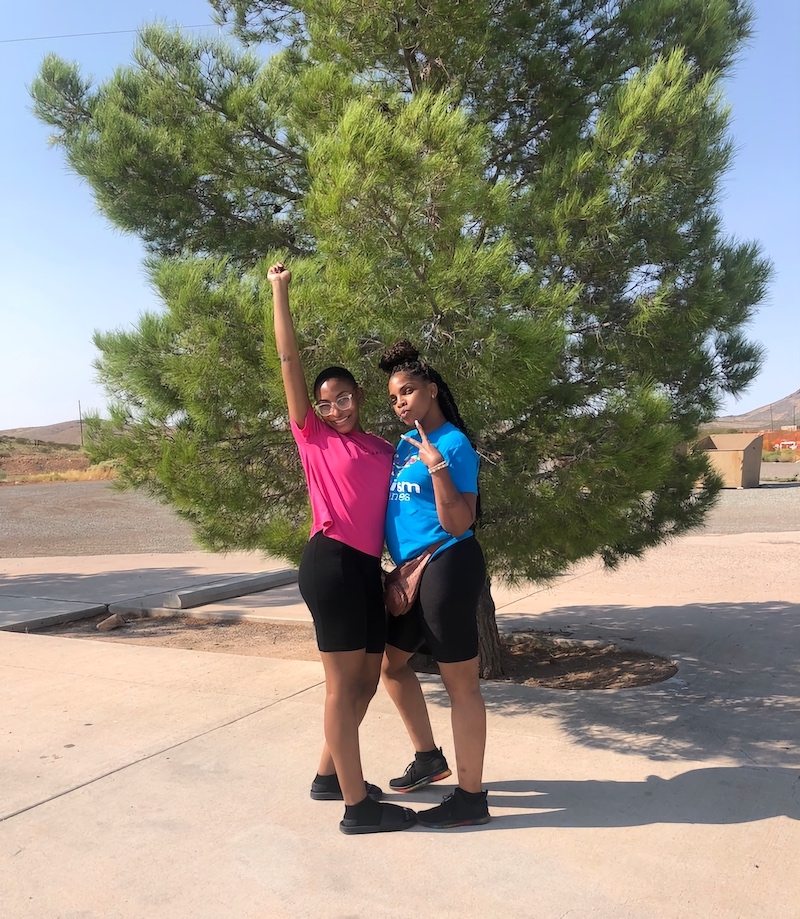

My mom stayed for a few days to help me get some apartment things that I needed then flew back home. I got some rest on Friday and Saturday then it was time to prep for school on Sunday. I added all of my classes, work times, and lab meetings to my calendar. My trusted planner is back to being glued to my hip. My sticky notes are fully stocked. I still do not have a desk but hopefully that will change in the next week. *fingers crossed* Time to get back to business! I am feeling a bit stressed and nervous but I did this before which means I am capable of doing it again.
SO . . . how am I preparing for another fast-paced and intensive semester from home?
Last semester, I found a few things that helped reduce stress and made me feel a bit more balanced. They are all easy and I hope that they can help you too.
- Exercise
The biggest challenge is starting. But, once you are in it, it feels great. Not only does it feel like stress is being released with your sweat, it also adds to your list of accomplishments for the day. Even if you are unable to do anything else, at least you can say that you got in a good workout. It feels awesome to check something off of the list and it motivates you to do more. Exercise does not always have to be exhausting—it can actually be very energizing. I like to work out at the start of my day. Knowing that the remainder of the day will be spent sitting in class, exercising in the morning helps me get into a positive headspace. - Go outdoors
Use any opportunity that you can to go outdoors and get fresh air. This one is pretty simple. Smell the flowers, hear the birds chirping, feel the sun on your skin. This is necessary. Your cozy home cannot provide what nature gives you. Even if it is as simple as going out to get the mail or walking to your car, take a few extra moments to enjoy being outside. - Hang out with your friends
*in a socially distanced way! Zoom calls and facetime is cool and it works if it is your only form of communication. But after being online ALL day, it can sometimes feel like an extra chore. If you can go to a park and spread out, do that! It is nice to see your friends’ faces in person. It’s also a change of scenery which is just as necessary and meaningful for your mental health.
I know that we all hoped things would look better by now and the fact that it is not can really dampen the mood. However, taking note of the little things that make you happy or make you feel even a little better is very important. Now is the time to find joy in the small things.
⋯
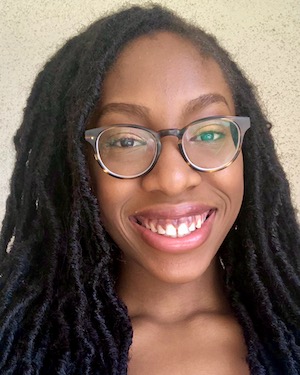
To New Beginnings ⟩
August 21, 2020, by Nmachi
As of this past Monday, I have officially started my second year in the Bachelor’s to Master’s program! The start of this new chapter has left me with mixed emotions. On one hand, I am very excited to advance to my sophomore year of college and get back into the routine of attending lectures and acquiring useful knowledge. On the other hand, I can’t seem to get over the fact that I am starting my sophomore year at home, away from campus and friends. Despite feeling distanced from campus life, I have thankfully found ways to stay connected during this unpredictable time.
With the start of this new school year, I am sadly wrapping up my time as the Chan Summer Student Ambassador. I just want to take a moment to thank all of the amazing OT-lovers that I had the privilege to meet and work with this summer. All of you were so welcoming and made me feel like a true asset to the OT community at USC. I appreciate all of the praise and feedback given, and I am certain that I will become a better student and future OT from all that I have learned from you all!
Embarking on my sophomore year and completing my role as the summer ambassador can both be summarized by one word: bittersweet. I am sad to leave the amazing team of ambassadors and faculty, but I am equally hopeful for what’s to come in my future of OT. This opportunity has allowed me to grow in my love for occupational therapy, and I can’t wait for what’s to come. 😊
⋯
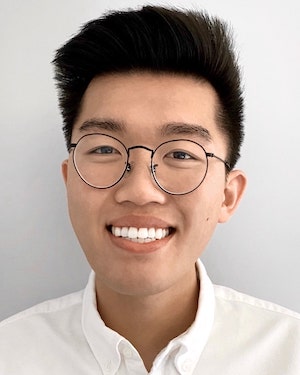
New Occupation, Who This? ⟩
August 18, 2020, by Calvin
Classes Videos What are OS/OT?
The bittersweet summer semester is over! This was my first full semester online and honestly after I hit the “submit” button on my last final exam, I was so relieved and just felt so much freer. Thankfully, we all get one week off to destress before getting back on the grind for the fall.
Something I really wanted to do during the break was tie-dye, and I know what you’re thinking: “that’s so random . . . what does that have to do with anything?” Well, in the OT 534: Health Promotion and Wellness course, Dr. Laura Cox and Dr. Kelcie Kadowaki (both on the Faculty Practice Team) gave us a class day to practice self-care and mindfulness by offering various “Wellness Workshops”. I joined the “Tie-Dye” group because I had never done it before and it seemed really fun! It was so nice to step away from lectures to loosen up, and it reminded me that sometimes I just need to breathe and be in the present. I echo the sentiments of Bethany, Lamoni and Savi’s blog posts about remembering to be good to ourselves, to do what we can, and that it’s okay to give ourselves the time and space we need. I hope that this video can serve as a reminder to practice self-care and also just give you a good laugh! Stick around until the end of the vlog for a very special clip! (Spoiler Alert: Liz makes a colorful guest appearance!)
⋯
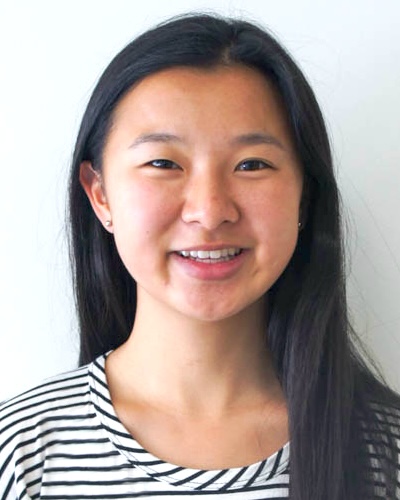
Be Prepared for Grad School ⟩
August 12, 2020, by Bethany
As part of the Bachelor’s-to-Master’s program, my entrance into the Master’s program was unique in that it was also my senior year of undergrad. It was a strange transition, as I was trying to get used to being a Master’s student while holding on to my friends and senior year activities. I struggled with being simultaneously at the top of the school “hierarchy” and the new kid. However, I learned a lot during this past year, and am hoping that if anyone starting this Master’s student life transition resonates with my experience, you can find a new tidbit of information to make the transition easier.
Make New Friends
I struggled with figuring out how to spend my time with people. I wanted to spend every last minute that I could with friends from undergrad, as I knew it was not likely we would live this close to each other again. We had to make the most of our proximity. And yet, it was hard to feel connected to people that I was in new classes with when I was not as open to conversations. It took me a while to realize that these students were going to be with me in the field, and they were people I could learn from and rely on. All this to say: (1) Take the time to have conversations. Whether it be in class (during designated discussion time such as breakout rooms, of course) or not, you can learn about a person even through the course material. One entire class discussed the Therapeutic Use of Self, so we discovered a lot about our own and each other’s personalities. (2) Take the time out of class to hang out. I did not do this one very well, but maybe once a month, whatever you can swing out of your free time, log on to an event. Go meet new people. Start up conversations with people outside of your cohort and classes. Many people would open conversation by asking about the Bachelor’s-to-Master’s program, so I had to learn to use it as a conversation starter, to ask about their own undergraduate experience. We’re all OTs, so we’re all here because we love talking to and helping people.
Another strange factor is our new professors. We meet different OT faculty during these next two years, all with different experiences and expertise. Each student is also paired with a faculty mentor according to their interests. Take advantage of their knowledge base; reach out to them with questions. (3) Use office hours. If you may be unsure of what area of OT you want to go into in the future, as I am, use each practice immersion to further understand your fit for each area. Have conversations with the professors, who are experienced members of their field. It is only during this time that you will have the excuse of class material to start conversations. Even if you can’t use that excuse, faculty are always happy to talk about what they are passionate about. They are also very understanding and can help with any difficulties into the transition to grad school and classes.
Bring a Snack
Three-hour classes feel longer than I care to admit. And although we do get stretch breaks, (4) have food ready! It’s helpful for staying engaged. Be sure that the snack is something you can eat relatively neatly, as you may want to type a quick note on your computer without having to wipe your fingers of Cheeto dust. (Or like some of my creative friends, you can eat Cheetos with chopsticks.) We also have a nice lunch break in between classes. If you’re on HSC, you can go pick up a burrito from the surrounding food trucks, or eat your own homemade lunch. Lunch time is still a great chance for a stretch break, and one good quesadilla, whether off the stove or from the cafeteria across the way, can be a turning point after a tiring class.
Any Time is Usable Time
This is a lesson that I learned riding the shuttle to and from campus, but it’s applicable in more ways than one. It can feel like a long commute to the Health Science Campus from the University Park Campus or from wherever you call home. However, you can make the most of the ride. I was able to journal on the shuttle if I was awake enough, or catch up on another thirty minutes of sleep (which was a more common occurrence). Start on school readings, review slides for the upcoming quiz, or re-read the Harry Potter series. Download a movie on your phone. If you’re driving, take the time to listen to new music on the radio, or get pumped up for the day with some of your favorites. Listen to a new podcast. (5) Make the most of seemingly unusable minutes, even if it is just to relax and take a break. Some of my favorite shuttle rides would be when I ran into a friend on the shuttle, often a friend from UPC that I had not seen in a while, and we would use the shuttle ride to catch up on life. Unusable minutes may take a different form while we’re taking online classes, but that goes into my next point . . .
Balancing Act
All of life is about balance, between work and school and friends and commitments. Adjusting to Master’s classes requires an adjustment of that balance. After completing a Blackboard quiz, make time to go grab dinner with a friend. My first semester, I personally decided to make time to stay in the Trojan Marching Band, blasting summer hits on Cromwell Field. Music was part of my life, and going to practice and playing piccolo was a bright spot in my day. (6) Make time for the things that keep you going. I had never used the calendar app on my phone so much as when I transitioned to grad school. My friend helped me color-code my schedule into different categories, a system I thought I would never use but ended up loving. Seeing the red of a band event or the green of an Intervarsity Christian Fellowship event was a bright spot in my day, and my calendar ensured that I did not miss things that were important to me. For me, this adjustment to online classes changes the balancing act. Now, it means calling a friend during my lunch break or taking time after class to play an instrument.
Lean on Your Support System
Every day, I’d come home to my apartment-mates, and I’d get to hear about how aerospace or linguistics classes were going and share about my own day. They and my other friends made time to let me ramble about adjusting to life and gave me time to just be myself. When I felt stressed, they would drive me out to get mandatory ice cream. When I needed a day out, we’d go to drive-in movie nights and have picnics. When I needed advice, they’d sit me down and tell me what I needed to hear, even when it was hard. You can find support in many forms, whether it’s finding tips on Calvin’s Survival Guide and reaching out to the student ambassadors, or having good, long conversations with friends. (7) Lean on your support system. These days, I go downstairs to do a workout with my mom and rant if I need to. But whether with friends or family, you are not alone in this.
Lastly, (8) be kind to yourself. It is a transition, and everyone will adjust differently. Don’t be harsh on yourself if the transition takes time. Make the most of these opportunities that we have: learn a lot, have fun, and Fight On!
⋯

A Little Piece of Normalcy ⟩
August 10, 2020, by Liz
The end of the summer semester is finally here, which means ahhhh it’s time for finals! It has been a rollercoaster ride switching to remote learning and adjusting to the changes that had to be made to our school curriculum. As wonderful as it is to learn from home and wear pajamas all day, there’s so much that I miss from being back on campus. My friends have been at the top of my “what I miss the most about being on campus” list.
As I previously shared with you all, after switching to remote learning I temporarily moved back home with my family in Santa Ana. Prior to all the changes made, my friends and I were lucky enough to find a unit that had enough space for the four of us to live together — our dream come true! Although we were really excited about finally getting the chance to be roomies, two of my friends went back home out of state and didn’t know if it would be the best idea to move back given that there was a chance a lot of what we would be doing would be done online.
After much thinking, they decided to move back to LA and we were able to continue on as planned! The main reason we decided to move forward with our plan was because we were all struggling to stay focused and get academic work done back home. When living close to campus there’s so many places to study like coffee shops, the library, or even outside on the patio. But with stay at home orders and trying to contribute towards getting everyone safe, those spaces where we were all able to focus and get work done were no longer accessible. So, moving back to LA with people who are working towards the same goal makes it a little easier to stay focused and get work done. I should mention that in order to keep everyone safe, we all decided to schedule COVID-19 tests to make sure we were okay before getting too comfortable with each other. Fortunately, we are all healthy and happy to be living under the same roof!
The move was stressful to say the least, and we had to switch gears and get into study mode. Although we’ve spent about 80% of our time studying and working on getting final projects turned in, we’ve made a little time to have some fun. Here’s a little bit of what I’ve done this past week:
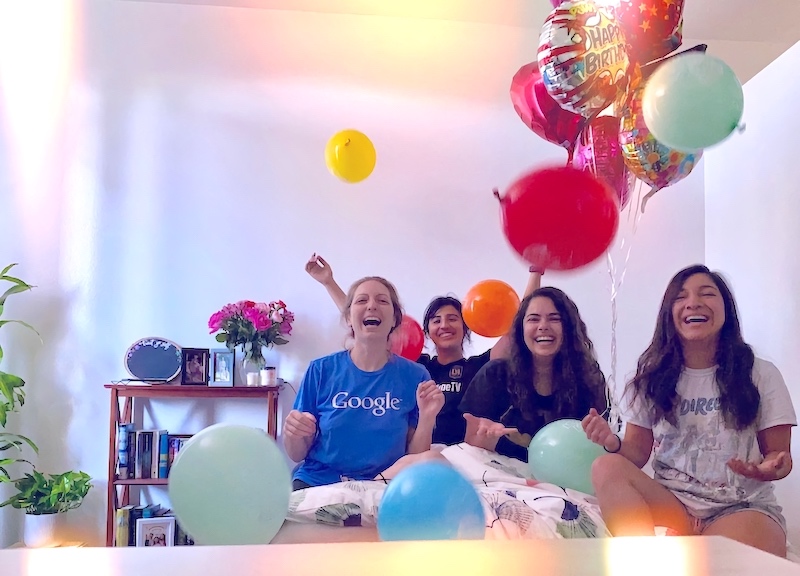
We celebrated MA-II student, Renee, turning 24! Also pictured, MA-II students Lorelei Ritter and Stephanie Gomez-Rubalcava.
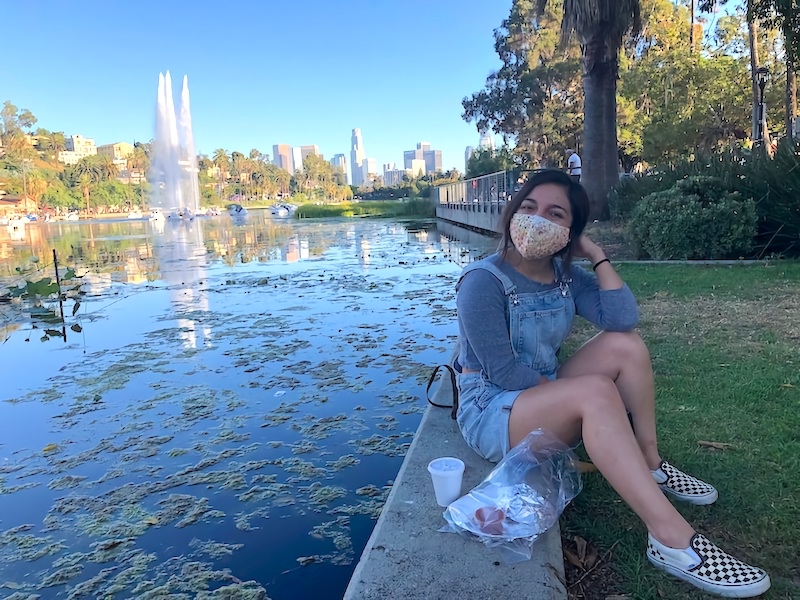
Picked up some of LA’s best tacos — Teddy Red Tacos and enjoyed them outside at Echo Park!

Started finals week the right way by picking up some delicious breakfast burritos at Azteca Tortilleria!
Although it’s been stressful getting settled in and starting finals week I am so excited that I get to end the summer studying with my favorite study buddies. I also wanted to share that even though it’s important to make time for studying and getting school work done, getting some time in for yourself and taking a break is just as important. Stay tuned to see how we transform our apartment into the perfect study space!
⋯





